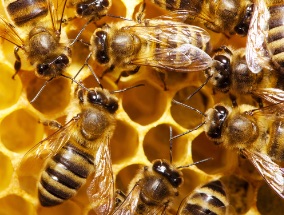Local Honey

There are big advantages to consuming local honey. We found our Atlanta source in Steve, the “Bee Man.” You should find honey local to you, too!
I use honey in my tea every morning. Having used store-bought honey for a while, I tried some honey my daughter bought at the market in Charleston. Oh my goodness, what a difference in taste! Then I remembered learning about how consuming local honey can help with allergies. Being from Atlanta where it’s completely normal for the pollen count to exceed 3000 or 4000 at certain times of year, I put out the word that I needed a local beekeeper. Steve, the Bee Man, was referred to me.

I was not disappointed! It was so good in fact that I had to know more about Steve and his honey. So I gave him a call! Come to find out that he was interested in honey for the same reason that I was. Steve grew up in Atlanta. Steve’s first interaction with bees was just 6 years ago and was nowhere near Atlanta or even the United States. Steve became close with a beekeeper while living in Ukraine as a missionary, and as their relationship grew so did his interest in the little fascinating insects.

This beekeeper told Steve all about the bee’s behaviors and their health benefits. Because of the allergy reducing benefits, Steve knew he wanted to learn more and possibly become a keeper himself. When he and his wife returned home from Ukraine in 2010 he started attending meetings held by the Metro Atlanta Beekeepers Association. Shortly after that he began the course to becoming a certified beekeeper. The MABA is an all-volunteer, non-profit organization that supports an active beekeeping community and promotes the art and science of bees and beekeeping to the Atlanta area through education, events and services. MABA wants the everyday Atlanta resident to know how important and endangered these insects are and hopefully inspire some of those everyday people to become beekeepers.
Most people are aware that bees make honey, pollinate flowers, and sting. But what I didn’t know is that “honey bees pollinate about one-third of our crops,” according to Steve Nelson. On top of pollinating crops, they also produce wax and honey, which is very beneficial to consume.
“It improves seasonal allergies, because the pollen from which honey is produced comes from the same trees and plants that give allergies,” he said. “Because of its contents, if honey is consumed on regular basis, it would work like a vaccination.” The unfortunate thing is that the bee populations in America are shrinking at an alarming rate. Honey bees might not be on the brink of extinction yet, but they need help to remain healthy and productive. “Some residents fear bees because they sting if they feel threatened, but if people knew how important they are they would seek to protect them,” Nelson said. This is why I am so thankful we have people like Steve Nelson who is not only a beekeeper, but also a rescuer and honey seller. Let us know if you would like Steve’s contact information to get some of his local honey!

Recent Comments